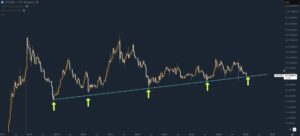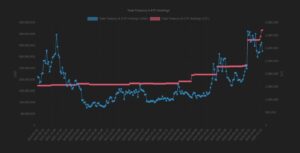TerraLuna’s Do Kwon was at the centre of attention prior to ticking off the cascading and calamitous events and busts of 2022, which included Celsius and FTX.
Following his arrest in Montenegro, the next steps are an open question and may depend on the jurisdiction in which Do Kwon is prosecuted. Will Do Kwon be extradited and put on trial? If so, per the Wall Street Journal, Mr. Kwon faces up to forty years in prison.
The Terra implosion; recap
When Terra collapsed in May 2022, it was one of the top-most trending blockchain networks behind Ethereum. At one point, Terra’s UST market cap even surpassed BUSD. But the warning signs began to manifest in April 2022, when Messari data revealed that the stablecoin’s trading volume was one fifth that of its closest competitor (BUSD), while its market cap had reached nearly $18 billion. The price-fundamentals mismatch began raising alarm bells. In fact, Blockstream CEO Adam Back was among the first to raise the red flag.
TerraUSD (USDT) quickly became popular due to the ‘algorithmic’ dynamic between Terra (LUNA), the network’s native currency, and TerraUSD (UST) stablecoin.
The latter was pegged to LUNA, such that smart contracts programmatically readjusted the supply of UST/LUNA depending on the demand for either. For example, if LUNA’s price increased, the algorithm would reduce the UST supply through buybacks of UST using LUNA. Consequently, UST’s price would decrease so the peg to the dollar stabilised.
The idea was supposed to remove reliance on traditional banks or stablecoin custodians. At the time, it seemed to have pushed the boundaries of decentralised finance (DeFi). Moreover, Terra’s lending protocol Anchor was especially lucrative for investors, offering up to 20% yields for UST deposits.
However, the fragility of this system quickly surfaced as the Fed began its hiking cycle. In early May, Do Kwon’s Terra came crashing down. Luna Foundation Guard’s Bitcoin reserves went to zero in a futile attempt to defend the peg. The whole ordeal was done and dusted in three short days (8-10 May), wiping out nearly $45 billion.
Do Kwon Suspected malfeasance
Following the crash, it took authorities three long months to begin looking at the incident. At first, Terra’s meltdown was seen as a failed experiment. But over time, optics on Do Kwon would turn critical, with criminal suspicion rising.
On September 26, 2022, Interpol issued a ‘red notice’ for Do Kwon, the South Korean co-found of Terraform Labs.
Following the arrest warrant from South Korean authorities due suspected fraud and breach of capital market laws, the ‘red notice’ was a world-wide call to action to apprehend him. At this moment, Do Kwon’s actions raised further suspicions.

Incredibly, he even appeared on the Unchained Podcast a month later, saying that charges were ‘politically motivated’. On February 16, 2023, the US Securities and Exchange Commission (SEC) also filed a lawsuit against Mr. Kwon, accusing him of “orchestrating a multi-billion dollar crypto asset securities fraud”.
Today we charged Singapore-based Terraform Labs PTE Ltd and Do Hyeong Kwon with orchestrating a multi-billion-dollar crypto asset securities fraud involving an algorithmic stablecoin and other crypto asset securities.
— U.S. Securities and Exchange Commission (@SECGov) February 16, 2023
The SEC sued Do Kown for multiple violations:
- Fraudulent scheme with the intention of misleading investors.
- Painting UST as stable while secretly colluding with a third party to buy large amounts of UST to restore the peg a year before the crash in May 2021.
- Selling unregistered securities and security-based swaps.
Shortly after in March 2023, Do Kwon, along with Terraform Labs co-founder, Hang Chang-joon, were arrested in Montenegro’s capital Podgorica, having been caught with several fake passports.
Looming extradition to South Korea
Naturally, the charges from his home country, South Korea, are similar. Briefly, Do Hyeong Kwon (31) is accused of faking the Terra ecosystem to siphon capital flows. This is comparable to how Sam Bankman-Fried used FTX’s FTT token to fake the exchange’s valuation, alongside several fraud charges to which his ex-associates had pleaded guilty.
The question now is whether Do Kwon will be extradited and prosecuted to the US or South Korea, since he’s still under arrest in Montenegro. As he told the WSJ, South Korean prosecutor, Dan Sung-Han, believes justice would best be served on home turf.
Given the nature of this incident, we think investigating the case in South Korea would be the most efficient way of bringing justice.
If the prosecution are successful in extradition proceedings, Do Kwon could get up to 40 years in prison.
The verdict would be in line with another convicted fraudster, Kim Jae-Hyun, the CEO of Optimus Asset Management. He was sentenced to 40 years for investment fraud in July 2022.
Join the telegram channel for updates, charts, ideas and deals.
Did you like the article? Share it!


